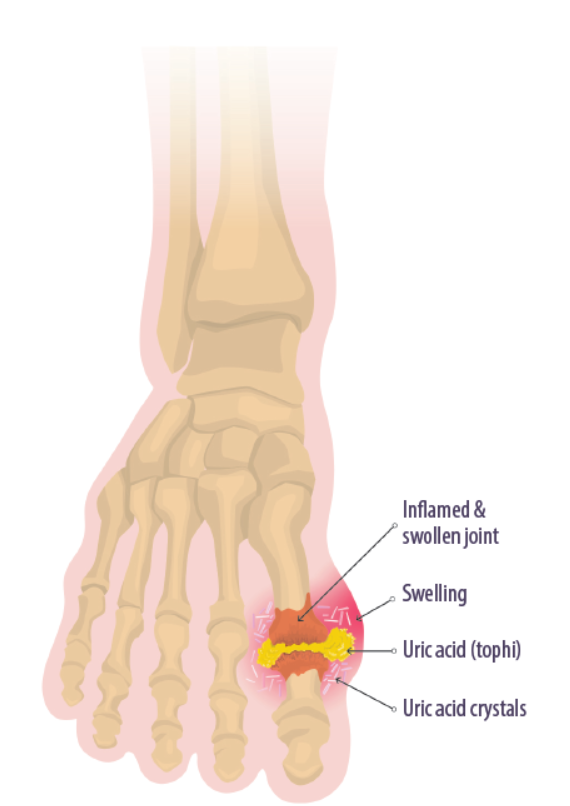More than nine million U.S. adults are living with the painful symptoms and disability caused by gout. Diet is an important part of avoiding flare-ups.
What is Gout? Gout is a common form of inflammatory arthritis linked to high levels of uric acid in the body. Uric acid is made when purines—compounds that occur naturally in the body and are also found in some foods and beverages—are broken down. Typically, uric acid in the bloodstream is carried to the kidneys, where it exits the body in urine. If blood levels of uric acid are too high, the kidneys can’t keep up and the blood uric acid concentration rises (a condition called hyperuricemia). In people who are predisposed to gout, this can lead to the formation of uric acid crystals that get lodged in the joints, particularly the lower body joints like toes, ankles, and knees. The accumulation of these sharp-edged crystals sometimes triggers inflammation which can result in a painful gout attack, or flare-up. Not everyone with hyperuricemia will get gout, but once it develops it’s likely to return without treatment to lower uric acid levels.
Gout can affect anyone, regardless of lifestyle. “A lot of risk is hereditary, as gout very much runs in families,” says Steven Vlad, MD, PhD, a rheumatologist at Tufts Medical Center. Gout is more common in men, women after menopause, and people with diabetes, overweight, obesity, or kidney disease.
What to Do. Managing uric acid levels can help prevent gout attacks and slow joint damage. “When attacks occur infrequently (once a year or less), we generally start with recommending dietary changes,” says Vlad. For people who suffer more frequent attacks—two to three times a year—uric acid-lowering medications are used as well. Research shows that weight reduction through diet and exercise can reduce uric acid levels and risk of gout flares.
For people who have gout, avoiding or limiting purine-rich foods is recommended to reduce risk of flare-ups. High-purine foods include red meats (beef, lamb, and pork), organ meats (like liver), and some types of seafood (including anchovies, sardines, and shellfish). Note that the overall health benefits of consuming fish are thought to outweigh risks in people with gout. It’s also important to know that high-purine vegetables, including asparagus, spinach, peas, and mushrooms, have not been linked to raising uric acid in the blood. Consuming dairy products, particularly low-fat dairy, has been associated with lower levels of uric acid and a lower risk of gout flare-ups.
Added sugars are also associated with gout risk. It is advised that people with gout limit or avoid sugar-sweetened beverages and other sweetened foods, such as sugary cereals, baked goods, and candy, and limit consumption of naturally sweet fruit juices. Naturally sweet whole fruits are not restricted—these healthy foods contain protective nutrients like antioxidant vitamins, which research suggests may have an anti-gout mechanism.
Alcohol consumption is associated with increased risk of gout flare-ups. Swap out boozy beverages and hydrate with water, non-sweetened beverages, or coffee. Additionally, dehydration has been shown to increase uric acid levels and trigger gout because it makes it harder for the kidneys to filter uric acid from the blood.
Research has found that people with hyperuricemia tend to have an overall diet which is low in vegetables, lower than average in dairy intake, and higher in alcohol consumption. Work towards an overall healthy dietary pattern to reduce your risk for flare-ups of this painful and debilitating disease.
- Know your risk. Family history, overweight and obesity, kidney disease, and diabetes put you at higher risk for gout.
- Start with diet. Avoid or limit purine-rich foods, including red meats and liver, and skip added sugars and alcohol, which raise uric acid levels.
- Swap it! Replace red meat with poultry and plant-based proteins like lentils and soy; alcohol and sugar-sweetened beverages with unsweetened options, coffee, or water; and sugary treats with vegetables, fruit, and nuts.
- Weigh in. Maintain a healthy body weight with diet and physical activity to lessen gout risk.

























Good advice. Also keep hydrated.